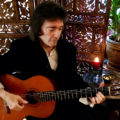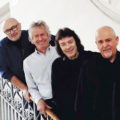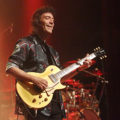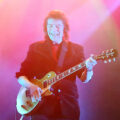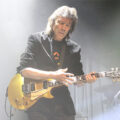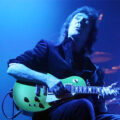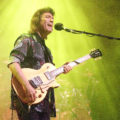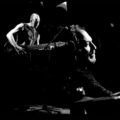“Supper’s Ready”: Steve Hackett’s “The Circus And The Nightwhale,” Genesis’ “Foxtrot At Fifty”
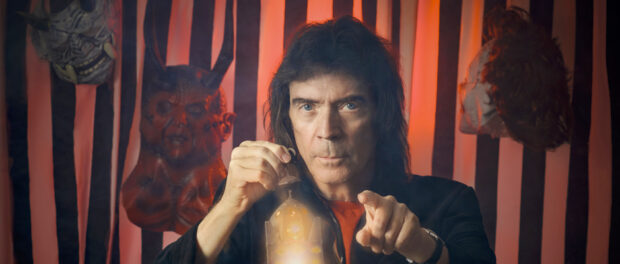 Photos provided by Tina Korhonen and Lee Millward / Chipster PR
Photos provided by Tina Korhonen and Lee Millward / Chipster PR
Ever since voluntarily walking away from Genesis towards the tail end of the 1970s, Steve Hackett became one of the most prolific and progressive guitar gods, who after the February 16th release of the conceptual collection “The Circus And The Nightwhale,” will have a whopping 30 solo albums to his credit.
That’s not even including the Rock and Roll Hall Of Famer’s fabled work alongside Peter Gabriel, Phil Collins, Mike Rutherford and Tony Banks, which includes such intricate, weirdly wonderful epics as “The Lamb Lies Down On Broadway,” “Selling England By The Pound” and “Foxtrot.”
Each of those artful eras will be on display when the “Foxtrot At Fifty + Hackett Highlights” Tour makes an encore appearance at the Copernicus Center on Friday, March 29, though in the meantime, Hackett rang Chicago Concert Reviews for a rundown on the fascinating new narrative, this show’s “Supper’s Ready” centerpiece, Genesis’ recently released “BBC Broadcasts” and what it was like getting the iconic group off the ground.
What’s your vision behind “The Circus And The Nightwhale”?
Steve Hackett: I’d like to think that it’s personal, but also universal. It starts literally in 1950 when I was born with the track “People of The Smoke,” which refers to London. London 1950 [was] very polluted, very crowded, over crowded, heavy industry, a very different world from the one we have today. Ecology was a concept not even born at that point I think, but London in post-war recovery, the track refers to that. I’ve tried to make it a kind of film for the ear in terms of the sound collage at the beginning. Radio that’s literally from 1950 and then other things…from that time when Londoners were going to be voting in a new government and things follow very, very quickly. Snippets of sound from the BBC…a baby’s cry… and then a sustained note out of the baby’s cry, which then is taken up with the rhythm of a train getting faster and faster. Then an orchestra kicks in, and then a rock band and that all happens within the first minute or so. I’ve used a lot of sound effects on this and that sound collage is something that drives the video for “People Of The Smoke,” which came out very nicely as it happens. That kicks off the album.
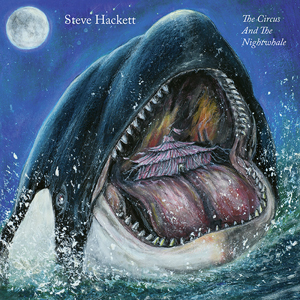 The album really goes through my story. It becomes more symbolic, and more fantastic and magical as it continues into other realms. I wanted it to be universal as well as personal…Everybody has their journey…The narrative is what drives it and I hope people have caught on to the various cycles, what they’re all about, and what the “Circus” may be…Everyone seems to be interested in the story, much more so, I think, than any album I’ve ever done. It’s very difficult to give it adequate explanation over the few minutes that we’ve got to talk, but there will be various things in the sleeve notes. There will be a map to it (laughs).
The album really goes through my story. It becomes more symbolic, and more fantastic and magical as it continues into other realms. I wanted it to be universal as well as personal…Everybody has their journey…The narrative is what drives it and I hope people have caught on to the various cycles, what they’re all about, and what the “Circus” may be…Everyone seems to be interested in the story, much more so, I think, than any album I’ve ever done. It’s very difficult to give it adequate explanation over the few minutes that we’ve got to talk, but there will be various things in the sleeve notes. There will be a map to it (laughs).
Tell us a bit about what the main character, Travla, represents.
Hackett: We’ve got Travla [who is symbolic of the fact that] everybody travels through life. It’s the journey, and the development and the way that you change. The things you’ve got in your heart set on when you’re very young, those priorities change as you evolve from wherever you were as a dribbling child, to when you’re controlling your environment, but at the same time, the environment starts to impinge upon you and wants to control you as well. I think, also, English education does sort of tend to knock you back, whereas American education tends to encourage you much more. We’ve noticed that our American friends are much more confident than the Brits, who are usually perplexed, always trying to get the best out of themselves, never thinking that they’re quite good enough…[America] seems to be very much, “you can do this,” whereas the English tell you “you’re nothing special.”
How do you plan to incorporate these tracks into your upcoming shows?
Hackett: We’re still on catch up, so in the areas that I haven’t taken the stuff to in the States, I’m still advertised as doing the whole of “Foxtrot,” so I will deliver that, but there will be at least three new tracks from the new album. That’s the plan and there will be other solo things as well. I haven’t decided to do an entire new album yet. I haven’t quite gone down that route of: “The Lamb Lies Down On Broadway,” here we come! An entire new album for the first set, it’s tempting, but I’m also aware that there are things that the band like playing and there are things that the audience like to hear, so I’m happy to run a middle course between the favorites and do these other things…I have to say I’m very pleased with the new album. I think it’s rather lovely, whether it’s vocal harmonies, or the way things are being played, or the types of songs. The whole narrative thread, I think, works out very well throughout the course of the album.
What’s prompting you to bring “Foxtrot At Fifty” back to the Copernicus Center?
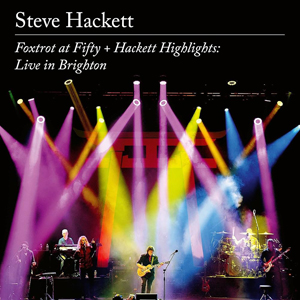 Hackett: Well, that’s a very strange thing because Danny Zelisko, who’s our promoter, wanted us to come back to Chicago and the set that we’re doing is largely “Foxtrot”-based. As far as I know, that’s going to be the one and only [encore]. I have to really do that, but hey, we might have the odd jam, you never know. It’s proved to be a great area for us, Chicago. They’ve been fantastic in recent times.
Hackett: Well, that’s a very strange thing because Danny Zelisko, who’s our promoter, wanted us to come back to Chicago and the set that we’re doing is largely “Foxtrot”-based. As far as I know, that’s going to be the one and only [encore]. I have to really do that, but hey, we might have the odd jam, you never know. It’s proved to be a great area for us, Chicago. They’ve been fantastic in recent times.
What did that album represent for Genesis? Any memories of the original tour?
Hackett: It was an album that went to number one in Italy. I think that “Foxtrot” was really the first of Genesis as a theatrical unit, as much as doing some cutting edge music. Those songs, again, were stories and conceptual within themselves. There wasn’t an overriding concept to that album, but I remember at that time, people were starting to accept Genesis, and being interested in the very complicated and long songs that we were doing. I think the way we were handling the early light shows and Peter Gabriel depicting the action, by the time we were continuing that idea in “Selling England By The Pound,” we had things to tour at that time.
The best of “Foxtrot” and the best of “Selling England By The Pound” was a heavy concoction, I think, for our early American crowd. They didn’t always get it. Sometimes they’d be up at the bar cause we were playing a lot of clubs at the time. Clubs, colleges, it wasn’t really the concert hall. There might have been the occasional concert hall, but that was to follow, maybe two years later. By the time 1974-1975, we were doing a lot more concert halls with “The Lamb Lies Down On Broadway.” I think it marked the beginning of something special. The band trying to create, all being able to work together, to be able to incorporate a light show into a mellotron show, all of those other things that were so vibrant with Genesis because we had a team of young, budding writers all really hot to run with it. We were young guys, but I think some of the ideas were very mature, very old. I think it was a great album and I’ve come to the conclusion learning it all again to do it in its entirety. It’s made me aware how very strong the songs were on that album. I think if you take all of the songs of “Foxtrot” and all of the songs of “Selling England By The Pound”- that era, which is 1972-1973- I don’t think there’s a weak song on either one of those albums.
I think it was a golden period of Genesis. That was the golden period and this is the purple patch of now for me. I love doing the new stuff. I loved putting together the album as I’ve loved doing all of the recent things. The recent team that’s involved, Roger King . [keyboards, programming, orchestral arrangements], and Jo, my wife, we’ve come up with some really, really strong things in recent times. I think it’s every bit a match for the best of what we’d done then…
Many have referred to “Suppers Ready” from “Foxtrot” as the holy grail of progressive rock. What do you think?
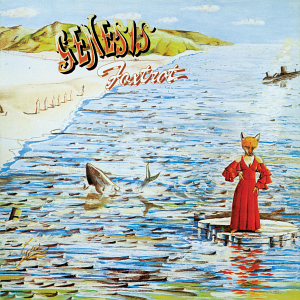 Hackett: The funny thing is there’s an English magazine called “Prog,” so it specializes in progressive stuff and I think, in a way, they’ve been largely responsible for reviving the genre, which is why I’ve been able to do the Royal Albert Hall this year in the UK. Their readership voted it as their top cut and there are lots of great tracks by lots of great artists. [Back when we were working on it, I remembering saying], “I think if we do a light show and we have everything going for it, we can do a long form track that goes through a lot of changes and it can be like a lot of tracks all in together, be the opposite of what singles are all about. It will be a journey, but if we want to have everything going for it, we must have the light show. We must have all the sound effects.” So it meant that essentially we would need to have an effects track to have the children’s voices, to have the shutting doors and the old chains that appeared on “Willow Farm.”
Hackett: The funny thing is there’s an English magazine called “Prog,” so it specializes in progressive stuff and I think, in a way, they’ve been largely responsible for reviving the genre, which is why I’ve been able to do the Royal Albert Hall this year in the UK. Their readership voted it as their top cut and there are lots of great tracks by lots of great artists. [Back when we were working on it, I remembering saying], “I think if we do a light show and we have everything going for it, we can do a long form track that goes through a lot of changes and it can be like a lot of tracks all in together, be the opposite of what singles are all about. It will be a journey, but if we want to have everything going for it, we must have the light show. We must have all the sound effects.” So it meant that essentially we would need to have an effects track to have the children’s voices, to have the shutting doors and the old chains that appeared on “Willow Farm.”
Peter Gabriel and I were absolutely adamant that we should have all that going to retain everybody’s interest on the track. Now by the time this was all stitched together, I had no idea whether our record company would sanction this or not, but Tony Stratton Smith, who was the record company boss, when we gave it to him, I was very, very nervous, but he said he absolutely loved it, thought it was great, loved the breadth of the writing and all of that. And I think the fact that it became so popular, especially with live audiences, and still is popular today, there’s something about it. There’s a Hunter Davies book about The Beatles, [“The Authorised Biography”], just at the time when they’d done “Sgt. Pepper’s [Lonely Hearts Club Band].” They really wondered if they stuck their neck out too far. Nobody in the band was absolutely sure whether people were going to respond to this. In an alternative universe, there could’ve been critics that would savage the whole thing, instead of which everybody embraced it to such a degree because it was so different…Actually it’s funny, when you take a risk, when you go out on a limb like this, although it seems crazy now, we’re 52 years after the event, it seems unthinkable that you would be worried when it all seemed like its plain Polish in hindsight, but it wasn’t at the time. We got away with it and now I realize it’s important for people. They like the journey.
Are there any parallels to what you were doing then and now?
Hackett: In a way, I guess what I’m saying is what I’m doing presently with the current album, back to that level of narrative and I just hate to use the word “concept” because it was such a dirty word at one time, that people go, “oh, not another concept album,” but I will say narrative is what drives it…[Each] piece hangs together as one continuous piece of music, the very thing that DJs hate of course. But I feel you get on board with it by doing that and changing scenery. If you don’t like one song…it moves on to another scene. You might like the love song scene. You might like something that’s more angst-driven. You might like the urban stuff. You might like the heavy metal stuff, but one thing that’s guaranteed is it changes scenes very quickly. I think that all those things don’t outstay their welcome with the album. I didn’t want to have guitar solos that were overly long. I didn’t want to have songs that were overly long. I wanted to use brevity as a calling card. I want to be able to take people through a journey. That’s very, very important for me.
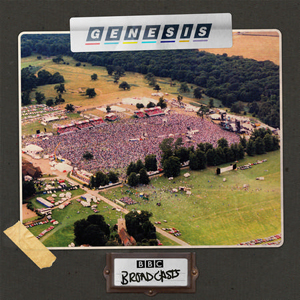 You’re also part of Genesis’ recent “BBC Broadcasts” box. What are your thoughts on those recordings finally being released and is there anything else in the vault?
You’re also part of Genesis’ recent “BBC Broadcasts” box. What are your thoughts on those recordings finally being released and is there anything else in the vault?
Hackett: To be honest, I think that there were lots of bootlegs that were very, very strong and I think the BBC stuff, sometimes I would hear mixes where things were obviously wrong. But it seems to me that, I think, it’s a case of some of the stuff, you know, is pretty rough and ready, and it was not done in front of a live audience. So the stuff that we were doing in front of a live audience, at least there was an honesty to that and I’m hoping that it will become part of an archive situation where other things will be released. For instance, the last show that we did in front of 18,000 people at London’s Earls Court in 1977, I would really like to see that out there. I’ve got a bootleg of that and I remember sending it to [Genesis’ manager] Tony Smith saying, “I think this is good,” but I didn’t hear anything back, so hey, you know, yeah, I’m happy for all of it to be released, but that’s what I’d do. I’m not in the driving seat of being able to say what’s being released, but…better late than never I reckon.
Speaking of new albums, what are your thoughts on Peter Gabriel’s “i/o” after more than two decades between proper studio projects?
Hackett: You know what, I haven’t heard it yet. I’ve been so busy. I’ve been run off by doing so much stuff that I can barely keep up with my own things (laughs) as much as I love Pete and I make sure I speak to him at least once a year to see how he’s doing, usually around about our birthdays. I’ll be interested to hear the whole thing and I hope people like his album…I think we’ve got very different approaches. I don’t like to labor things that long. I like to work very, very quickly and I like to tour a lot, so I think we’re very different types in that way, but I think we both like experimentation, that’s for sure. I just think we’re just driven by different demons.
Last but certainly not least, what keeps you so prolific?
Hackett: I love music. I love the energy that it gives you…but there’s also the love of a very good woman in my wife, Jo. I find her particularly inspired and she’s so connected in making sure that things go right. She’s very creative, so I’m very lucky I have her. We came up with this cover idea between us and she’s been largely responsible for the way that the album has shaped up. It’s a marriage of ideas, as well as the other kind of marriage that people have, so we cover a lot of bases between us.
Steve Hackett performs at the Copernicus Center on Friday, March 29. For additional details, visit HackettSongs.com and CopernicusCenter.org.

